|
|
|
Sort Order |
|
|
|
Items / Page
|
|
|
|
|
|
|
| Srl | Item |
| 1 |
ID:
142612
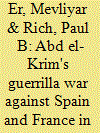

|
|
|
|
|
| Summary/Abstract |
The Riffian rebel leader Mohammed Abd el-Krim Al-Khattabi (1882–1963) became an important early guerrilla leader by successfully initiating extensively organized resistance in the Moroccan Rif against Spanish and French imperial power in the early 1920s. The Rif War triggered a wave of adventure films since the 1930s. This article will look at some of these, especially Sergeant Klems (1971) and The Wind and the Lion (1975), and suggest that they can be seen in terms of the wider impact of screen Orientalism derived from the iconic film Lawrence of Arabia (1962) directed by David Lean. The article will show that these films promoted what it terms a colonial gaze by underlining many stereotyped cinematic clichés relating to the Islamic cultural area and Abd el-Krim's revolt that stretch back to the early history of cinema.
|
|
|
|
|
|
|
|
|
|
|
|
|
|
|
|
| 2 |
ID:
152866
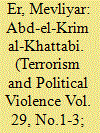

|
|
|
|
|
| Summary/Abstract |
Abd-el-Krim al-Khattabi's guerilla tactics are said to have influenced several renowned revolutionaries, such as Ho Chi Minh and Mao Zedong. There is evidence that Che Guevara equally employed at least some of the tactics and methods, which were devised by the Rifis. After all, Alberto Bayo, the much respected guerilla trainer of Che, had fought during his military career for a relatively long period of time against the Rifis. Castro, yet another role model for Che, mentions in his biography that he read about the battle of Annual, one of the most successful attacks against the Spanish initiated by Abd-el-Krim in 1921. There are also claims that Che had met Abd-el-Krim in 1959 in Cairo. Castro does not mention that he had discussed with Che anything about his readings on the Rif War, but he clearly states that Bayo used to teach in his camp guerilla methods that he had encountered during his assignments in Morocco. However, neither Bayo nor Che (or their biographers) mention that any of the tactics imparted during the training were from the time of Abd-el-Krim's struggle. The only person praised by both men is the Nicaraguan rebel leader Augusto César Sandino. This article compares the tactical teachings of Bayo as well as the operational methods used by Che during his battles in Cuba with the methods applied by the Rifis under Abd-el-Krim's leadership, and highlights a number of tactical similarities. It also finds that the guerilla tactics applied by Sandino have little in common with the methods described by Bayo.
|
|
|
|
|
|
|
|
|
|
|
|
|
|
|
|
| 3 |
ID:
096522
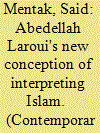

|
|
|
| 4 |
ID:
110161
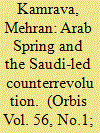

|
|
|
|
|
| Publication |
2012.
|
| Summary/Abstract |
The author contends that the Arab Spring has provided an opening for the Gulf Cooperation Council as a group and for Saudi Arabia as a long-time aspiring leader of the Arab world to try to expand their regional influence and global profile. An already weakened Arab state system, he argues, has been once again weakened by the sweeping wave of rebellion.
With its final chapter yet to be written, the Arab Spring of 2011 is likely to go down in history as a season of profound political changes that swept across the domestic politics of the Arab world. Even at this preliminary stage, that much is clear. What remains unclear, however, is how political change sweeping across the Middle East and North Africa is likely to alter the international relations of the Arab world in general and, in particular, the larger regional position and specific policy preferences of the Gulf Cooperation Council (GCC). Important considerations include the GCC's posture and profile vis-à-vis the Arab Spring, its collective reaction to the region-wide movements for political change, and its delicate relationship with its two troubled neighbors to the north, namely Iran and Iraq.
While the Arab Spring is unlikely to result in meaningful changes in Iran and Iraq's relationships with the GCC, it has fostered two discernible trends in the larger Arab world. First, Saudi Arabia has sought to reassert its position of prominence and leadership within the GCC. In fact, the kingdom has positioned itself as the chief architect of a counterrevolution to contain, and perhaps to even reverse, the Arab Spring as much as possible. Second, and an outgrowth of the first development, is the GCC's attempt to solidify its identity and mandate through the inclusion of additional Sunni monarchies-Morocco and Jordan-as a counterbalance, if not a substitute, to the Arab League.
|
|
|
|
|
|
|
|
|
|
|
|
|
|
|
|
| 5 |
ID:
132692
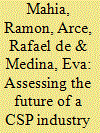

|
|
|
|
|
| Publication |
2014.
|
| Summary/Abstract |
This article presents the results of a survey on the feasibility of, and difficulties in, establishing a locally CSP manufacturing industry in Morocco. First, the survey explores which specific components of the CSP production chain could be manufactured in Morocco today and which would require moderate or significant changes being made in that country over the next decade. This paper contributes to demonstrating the potential for a CSP manufacturing industry in Morocco at the present time, ideal business models and current restrictions. Second, on the one hand this survey provides insight into the entrepreneurial, policy- and market-related barriers hampering the development of this industry and, on the other, the relative advantages offered by Morocco for the development of a CSP sector. Complementing the empirical findings on foreign direct investment determinants, this exercise stresses the key relevance of the economic context not only in terms of size, stability and predictability of the market, but also in regard to the critical importance of institutional and policy-related issues such as stability and public policy commitment. The results show that prior experience of firms in developing areas is a crucial issue in the accurate assessment of the risks and benefits associated with FDI decisions
|
|
|
|
|
|
|
|
|
|
|
|
|
|
|
|
| 6 |
ID:
163763
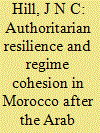

|
|
|
|
|
| Summary/Abstract |
This article argues that Morocco's competitive authoritarian regime is more resilient today in certain key respects than it was when the Arab Spring began. Drawing on Levitsky and Way's dimension of organisational power, the article contends the regime was sufficiently unnerved by the unrest to resort to the use of high intensity coercion as part of its response to the 20 February Movement. The article maintains that, in employing this force successfully, the regime has turned the protests into an important source of non-material cohesion for its security apparatus and thereby enhanced its ability to defend itself from similar challenges in the future.
|
|
|
|
|
|
|
|
|
|
|
|
|
|
|
|
| 7 |
ID:
178381
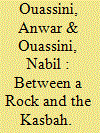

|
|
|
|
|
| Summary/Abstract |
This article explores the impact of tourism gentrification on the residents of the Kasbah in the city of Tangier, Morocco. It utilizes qualitative methods to reveal how the Kasbah has become a site of contention between the Moroccan neoliberal state, the foreign investors and settlers, and the residents of Tangier as they negotiate place and identity. The paper will examine how the process of tourism gentrification is not only reinforcing a demographic shift in the Kasbah by displacing the locals but also how the foreign urban settlers are increasingly becoming the filter through which traditional Moroccan culture is conspicuously produced and legitimized. The article will end with a discussion on the mixed contentions surrounding the gentrifying presence of the foreign urban settlers on the residents of the Kasbah and the city of Tangier.
|
|
|
|
|
|
|
|
|
|
|
|
|
|
|
|
| 8 |
ID:
131483
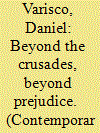

|
|
|
|
|
| Publication |
2014.
|
| Summary/Abstract |
As the Moroccan American scholar Anouar Majid reminds us on the first page of his latest book, Islam and America: Building a Future without Prejudice, we are drowning in information about the relationships of Muslims and the West but are not yet being rescued by this expanding corpus. This and his earlier We are All Moors come as close to any books I have read recently that hold out promise for such a rescue, at least in the forward-thinking rhetoric that outlasts the general effluvium of political punditry. Majid, who came to the United States in 1983, is currently director of the Center for Global Humanities at the University of New England in Portland, Maine. His training in literature has well prepared him to probe novels, poems, travel accounts and political manifestos for past reflections on how Islam has been perceived since the founding of the United States. His grasp of American history and a
wide range of historical sources consulted is a welcome contribution to a field where partisan political books stock major bookstores and reflective academic studies are read almost exclusively by a small circle of fellow academics. Both of these books deserve a wider readership that I fear they will not receive in the flood of punditry on Islam vs. the West
|
|
|
|
|
|
|
|
|
|
|
|
|
|
|
|
| 9 |
ID:
171307
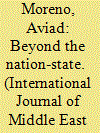

|
|
|
|
|
| Summary/Abstract |
The post-1948 mass migration of Jews from Arab Muslim countries to Israel is widely seen by scholars as a direct result of decolonization and rising nationalism across the Middle East and North Africa, coupled with the emigration and immigration policies of regional powers. In this article I draw on local histories of northern Morocco to critique the existing literature. I apply new methods to reconceptualize that migratory experience as shaped by social and cultural processes, albeit ones that interacted with nationalist state policies. I provide a multilayered macro- and microanalysis of the process of Jewish emigration from northern Morocco and point to the transregional, interpersonal, communal, and institutional networks that jointly shaped the dynamic character and pace of migration to Israel (and to Europe and the Americas) among local Jews.
|
|
|
|
|
|
|
|
|
|
|
|
|
|
|
|
| 10 |
ID:
160357
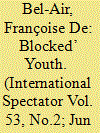

|
|
|
|
|
| Summary/Abstract |
Migration from South and East Mediterranean (SEM) countries has been considered a growing security threat in the EU and Gulf states following the 9/11 attacks and the Arab uprisings. Since 2011, the economic slowdown, regime changes and socio-political instability have spurred growing migration pressure from SEM countries. However, the securitisation of migration of young citizens from these countries in the EU and the Gulf states is manifested in the drastic limitation of migrants’ inflows, and in the selection of prospective migrants on demographic, socio-economic and political grounds. Today’s ‘governmentality’ of youth migration from SEM countries poses ethical and development-related issues.
|
|
|
|
|
|
|
|
|
|
|
|
|
|
|
|
| 11 |
ID:
160874
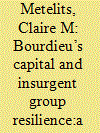

|
|
|
|
|
| Summary/Abstract |
The conflict between the rebel group, the Polisario Front, and the Kingdom of Morocco is nearing its 43rd year. Though under-reported, the conflict itself garners attention for the resilience – some would say tenacity – of the ethnically Sahrawi Polisario Front. Despite shifting regional and international politics and the nearly 150,000 Sahrawi refugees waiting in nearby Algerian camps, the rebel group has survived. What explains its resilience? This article uses Bourdieu’s ‘forms of capital’ to understand the Polisario Front’s persistence. Based on field research in Algeria, Western Sahara, and the United States, it finds that social, cultural, symbolic, and economic capital may provide an explanation.
|
|
|
|
|
|
|
|
|
|
|
|
|
|
|
|
| 12 |
ID:
118865
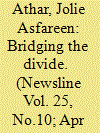

|
|
|
| 13 |
ID:
072279
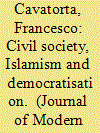

|
|
|
|
|
| Publication |
2006.
|
| Summary/Abstract |
The positive role that an active civil society plays in processes of democratisation is often highlighted in the literature. However, when it comes to the Middle East and North Africa, such activism is considered to be detrimental to democratisation because the predominant role is played by Islamist groups. The explanation for this rests with the perceived 'uncivil' and undemocratic Islamist ethos of such groups. This paper challenges this assumption and argues that Islamist associations can be a potential force for democratisation for three reasons. First, they are capable of political learning; secondly, they generate secular civil society activism as a response to their activities, increasing the number of actors in the political and social system; and finally, they can cooperate with other civil society groups on a number of issues, given that they are all subject to the same authoritarian constraints. The paper focuses in particular on the case of Morocco and the Islamist group Jamiat al-Adl wal-Ihsan.
|
|
|
|
|
|
|
|
|
|
|
|
|
|
|
|
| 14 |
ID:
117823
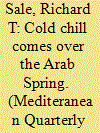

|
|
|
|
|
| Publication |
2012.
|
| Summary/Abstract |
Islam is on the march in the Middle East. For the past few years, in every Mideast election, the Islamic parties have won: in the Gaza Strip in 2006 and in Iraq and Tunisia in 2010. In 2011, they won again in Turkey and Morocco, and in Egypt the Islamist parties confirmed an overwhelming victory in the first parliamentary elections since the overthrow of Hosni Mubarak. The Muslim Brotherhood won the biggest share with the hard-line Salafist al Nour Party of Light. The youth groups that staged the demonstrations that toppled Mubarak took only seven seats. What are the implications for US policy and its ideals of self-determination and human rights? Will the liberals triumph, or will the Egyptian people face a hard-line Islamic future? This article attempts to answer these questions.
|
|
|
|
|
|
|
|
|
|
|
|
|
|
|
|
| 15 |
ID:
104154
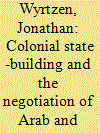

|
|
|
|
|
| Publication |
2011.
|
| Summary/Abstract |
Colonial state-building in Protectorate Morocco, particularly the total "pacification" of territory and infrastructural development carried out between 1907 and 1934, dramatically transformed the social and political context in which collective identity was imagined in Moroccan society. Prior scholarship has highlighted the struggle between colonial administrators and urban Arabophone nationalist elites over Arab and Berber ethnic classifications used by French officials to make Moroccan society legible in the wake of conquest. This study turns to the understudied question of how rural, tribal communities responded to state- and nation-building processes, drawing on a unique collection of Tamazight (Berber) poetry gathered in the Atlas Mountains to illuminate the multiple levels on which their sense of group identity was negotiated. While studies of identity in the interwar Arab world have concentrated on how Pan-Islamism, Pan-Arabism, and local nationalisms functioned in the Arab East, this article changes the angle of analysis, beginning instead at the margins of the Arab West to explore interactions between the consolidation of nation-sized political units and multivocal efforts to reframe the religious and ethnic parameters of communal solidarity during the colonial period.
|
|
|
|
|
|
|
|
|
|
|
|
|
|
|
|
| 16 |
ID:
156911
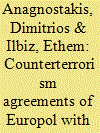

|
|
|
|
|
| Summary/Abstract |
This article investigates empirically the impact of power asymmetry and interest formation in the European Union’s (EU) external relations with third countries in the context of the Europol data exchange and counterterrorism agreements. It focuses on three countries, namely the United States, Turkey, and Morocco, which each have a different level of counterterrorism cooperation with the EU. This article argues that the EU acts as a pragmatic actor with regard to Europol’s data exchange agreements with third countries, and that the power asymmetry between the EU and the third country under question determines the extent of the EU’s flexibility. If the power asymmetry favours the EU, then it insists on its data protection demands. Otherwise, the EU is more flexible towards its counterparts on data protection issues.
|
|
|
|
|
|
|
|
|
|
|
|
|
|
|
|
| 17 |
ID:
124478
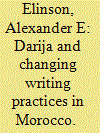

|
|
|
|
|
| Publication |
2013.
|
| Summary/Abstract |
Social, political, and technological changes have forced changes in the contemporary Moroccan linguistic landscape. In print media, advertising, music, fictional writing, and translation, Moroccan Arabic (d?rija) is being written in a variety of ways that point to a shift in perceptions and usage of d?rija in daily Moroccan life. In this article, I provide a discussion of recent developments in the use of d?rija in writing, and discuss how this evolving situation is articulated by intellectuals, journalists, publishers, fiction writers, and translators.
|
|
|
|
|
|
|
|
|
|
|
|
|
|
|
|
| 18 |
ID:
066381
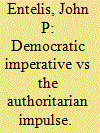

|
|
|
| 19 |
ID:
124475
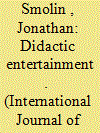

|
|
|
|
|
| Publication |
2013.
|
| Summary/Abstract |
This article traces the ways that the Moroccan Police Journal, a state-produced periodical that first appeared in 1961, constructed and disseminated an aspirational identity for the Moroccan police, one that was radically distinct from the image of the brutal security forces of the Protectorate period. Unlike other state-produced periodicals in Morocco or the Middle East at the time, Police Journal included fictional short stories written in the form of a police procedural, a genre that places a real-world criminal detective in the center of a narrative depicting a believable police investigation into a puzzling crime. As this article shows, these stories are the first examples of police procedurals in the Arabic language. The article examines three stories from Police Journal, tracing how they projected a new professional institutional culture for the police in the era of independence and served as both didactic pieces for police readers and entertaining works of fiction for the literate public.
|
|
|
|
|
|
|
|
|
|
|
|
|
|
|
|
| 20 |
ID:
079968
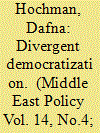

|
|
|
|
|
|
|
|